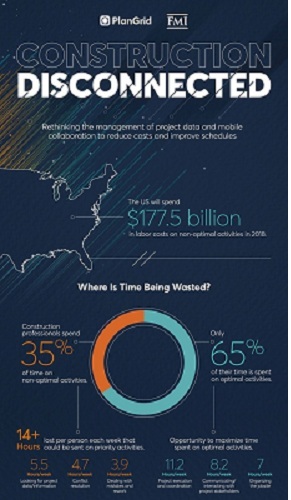PlanGrid, the leader in construction productivity software, shared results from a new industry research report administered in partnership with management consulting firm FMI Corporation of nearly 600 construction leaders about how teams spend their time on construction sites, communicate during projects, and leverage their technology investments.
The survey indicates that time spent on non-optimal activities such as fixing mistakes, looking for project data, and managing conflict resolution accounts for $177.5 billion in labor costs per year in the U.S. alone. The study also found that rework caused by miscommunication and inaccurate and inaccessible information will cost the U.S. construction industry more than $31 billion in 2018.
Key survey findings include:
1. Construction workers lose almost two full working days each week solving avoidable issues and searching for project information.
Each construction project team member spends more than 14 hours each week on average dealing with conflict, rework and other issues that take away from higher priority activities, according to the survey. Respondents revealed they spend the following amount of time each week on non-optimal activities including:
- Five and a half hours hunting down project data, such as revised drawings, material cut sheets and other information relevant to the job.
- Almost five hours on conflict resolution, including managing disagreements between stakeholders such as the general contractor, owners and subcontractors responsible for the delivery of the project.
- Four hours dealing with rework-related activities, such as managing the mistakes on a project that result in rework, assessing the associated costs and determining why the mistakes happened.
Due to time spent on these non-optimal activities, the industry will lose an estimated $177.5 billion in labor costs in 2018, which could equate to costs exceeding $2 billion per year for the average mid-sized construction company.
 2. Almost half of all rework is due to poor communication among project stakeholders, and poor project information.
2. Almost half of all rework is due to poor communication among project stakeholders, and poor project information.
Respondents attributed twenty-six percent of rework to poor communication between team members. The top three causes of miscommunication are unresponsiveness of team members; the inability of project stakeholders to collaborate effectively; and the lack of a common platform for all team members to communicate and share project data.
Respondents also said twenty-two percent of rework is due poor project information, where the top three causes are erroneous or incorrect project data, difficulty accessing project data, and the inability of project stakeholders to easily share information about the project.
Based on this data, FMI estimates poor communication represents a potential cost to the U.S. construction industry of $17 billion a year, and poor project data represents a cost of $14.3 billion, collectively accounting for a potential cost of $31.3 billion annually.
3. Workers are not taking full advantage of mobile devices and IT investments.
More than 75 percent of respondents provide mobile devices—smartphones or tablets—to their project managers and field supervisors. However, less than one-fifth of companies consistently (more than 80 percent of the time) use apps aside from just email, text, and phone calls to access project data and collaborate with project stakeholders. This finding suggests many construction leaders are equipping field teams with technology but aren’t getting maximum return on their investment by leveraging mobile software and apps purpose-built to help construction companies reach their full potential.
4. Technology is expected to improve data management and increase productivity.
According to the survey, executives are investing in technology for reasons that directly reflect the challenges associated with data integrity and accessibility, and overall demands for increased productivity. More than half of survey respondents shared the most common goals for technology adoption include providing better access to project data (58 percent), improving project productivity (57 percent) and increasing the accuracy of project information (56 percent).
“Poor communication among team members, and incorrect or inaccessible information that workers need to do their job is costing the construction industry tens of billions of dollars annually,” said Jay Snyder, FMI technology practice lead. “The majority of industry stakeholders seems to be at a loss for how to remedy these systemic and expensive problems. While construction firms continue to invest in technology, the business-critical issues of communication and data management need more strategic attention than they currently receive.”
“Construction companies are investing in mobile devices, but many teams are still relying on simple text and email rather than tapping more robust technology to collaborate and access project information,” said Stuart Frederich-Smith, vice president of product marketing at PlanGrid. “This proves a significant disconnect between the purchase of construction technology and the adoption of this technology in the field, and reveals the need for end users to be included the decision making process. Teams that have easy-to-use tools to collaborate in real time, a central source of truth and access to relevant data when they need it will have a greater competitive advantage.”
More details:
- “Construction Disconnected”: download the full report here.
- Blog post and infographic: can be found here.
- Webinar: FMI and PlanGrid will be discussing these results in more detail on a webinar on August 29, 2018 from 11:00 AM – 12:00 PM PT / 2:00 PM – 3:00 PM ET. To register visit here.
About the Survey
In April 2018, FMI Corporation partnered with PlanGrid to survey nearly 600 construction leaders and decision makers to discover how teams spend their time while on a jobsite, challenges associated with poor data management practices and miscommunication, and their technology investments. Participants in the study included 599 construction industry leaders. The sample was composed of 500 respondents from the United States and 99 from Australia, New Zealand, United Kingdom and Canada. Of those surveyed, 49 percent work for general contractor firms, 36 percent came from specialty trades and 15 percent were owners. Over 300 respondents came from the commercial sector and the other respondents represent industrial and manufacturing, heavy civil, healthcare, power (oil and gas, and energy), education and government.
About FMI
For over 65 years, FMI has been the leading management consulting and investment banking firm dedicated exclusively to engineering and construction, infrastructure and the built environment. FMI serves all sectors of the industry as a trusted advisor. More than six decades of context, connections and insights lead to transformational outcomes for clients and the industry. FMI helps you build your foundation for tomorrow and optimize your business for today. Industry Focus. Powerful Results. For more information, please visit https://www.fminet.com
About PlanGrid
PlanGrid builds simple, powerful software construction teams love to use. The company’s mobile-first technology gives general contractors, subs, owners and architects access to information in real-time, enables great collaboration and provides actionable insights. With PlanGrid, any construction team member can manage and update blueprints, specs, photos, RFIs, field reports, punchlists and other information from any device. PlanGrid is used on more than one million projects across commercial, heavy civil and other industries in 90 countries. Headquartered in San Francisco and founded in 2011, PlanGrid has $69 million in funding from Sequoia Capital, Tenaya Capital and other top venture capital firms. Visit us at www.plangrid.com




























